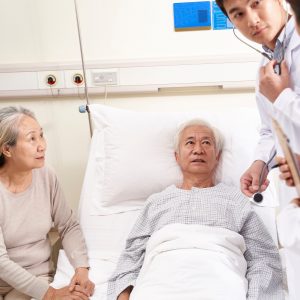Author: Shannon Fang
The Cultural Context of Hope
“You cannot tell him,” my mom repeated as we stood outside the hospital, the summer heat radiating off the sidewalk. I was always apprehensive about traveling to China, surrounded by an unfamiliar environment that should feel like home, a language I can haphazardly understand, and never-ending smiles to barely-known family members. However, on this trip, I had a different reason to be nervous.
It had been four years since I last saw waigong, my grandfather. Although distanced by language and cultural barriers, he always inundated us with freshly cut fruit, homemade chicken soup, and xiaolongbao from the best market in town. Although not a man of many words, his warmth melted my anxiety and replaced it with a full, satiated stomach.
“What do you mean I can’t tell him? He doesn’t know?” I asked in disbelief.
“It is for his own good,” my mom said.
Over the past few months, she exhausted herself flying back and forth to China, taking care of waigong. He had been losing a battle to pancreatic cancer. However, he did not know cancer was killing his body.
Growing up in America, I learned to value autonomy, one of the four principles of ethics drilled into us during medical school. Above all else, the patient has the right to make their own decisions.

I could not fathom lying to a family member about their illness. Stoically, I pushed back and advocated for my values. I urged my mom that withholding his diagnosis is wrong, and he deserves to know the truth about his condition. If you were him, wouldn’t you want to know?
“It’s not that simple, this is what’s best for him,” my mom stated, as we entered the building.
We maneuvered the crowded and labyrinth hospital halls, reaching waigong’s bed. The man who once had such a large presence now looked small, both literally and figuratively. He had not been able to enjoy the food he once loved, and loved to share with us.
Once he saw us, his face lit up with the warm smile I remember from years ago, though now with a
touch of jaundice and an abundance of exhaustion. I sat with him while my mom talked to the doctors. We shared very few words owing to my mediocre mandarin, but I understood what he wanted to say to me that day, and I believe he understood what I should have said to him. We sat in a shared silence of appreciation, my hand never letting go of his.
I wondered then if he knew he was dying. I wondered if he knew this was the last time he was going to see me. I wondered if I should tell him the truth.
After leaving the hospital, my mom said that was the first time she had seen waigong smile in weeks.
“Here, it is common to withhold a cancer diagnosis. Why do you think we have not told him?” she asked, but I could not imagine why.
“Hope,” my mom described. “If he does not know, he can still hold onto hope.” She explained that hope is thought to be a crucial ingredient to any treatment or cure.
“You can still have hope even if you know the truth?” I replied.
“Yes, but we are also protecting him from unnecessary distress and worry,” she said.
My family believed they were carrying the burden of illness so my waigong did not have to. They endured sleepless nights and immeasurable anxiety, then assumed a smiling face and optimistic demeanor for my grandfather, helping preserve his own energy to recover. Rather than valuing autonomy, my family nourished a collective beneficence for him.
Naively, I had insisted my mom do the “right” thing without understanding the context. The significance of autonomy is unfailingly emphasized in American culture that I believed it to be necessarily true. I learned from my family that the unwavering values cultivated in us are not absolute. Each culture, each society, each family, and each individual lives in different contexts.
As a physician in training, it is imperative to me to be conscious of my biases and realize when the “right” answer we are taught is not right for everyone. I should have trusted my mom’s decision and exercised curiosity about cultural practices, rather than imposing my own views. To provide true compassionate care to patients, I must appreciate and respect our differences, fostering our trust in each other to make the right decisions.
Shannon Fang is a third-year medical student at Case Western Reserve University School of Medicine and received her undergraduate degree from Duke University. Shannon is interested in pursuing a career in medical education, health humanities, and health care advocacy. Outside the hospital, she enjoys playing with her cats, crocheting, and watching college basketball.

